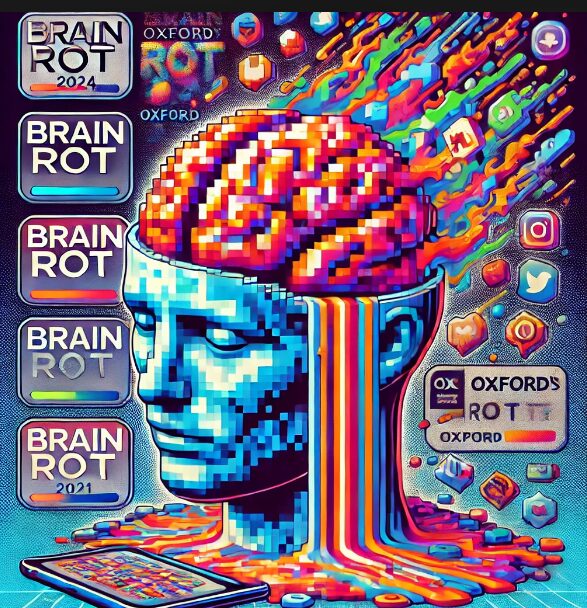Oxford Languages has officially named “brain rot” as its 2024 Word of the Year. This term resonates deeply in today’s hyper-digital society, where overexposure to trivial or low-quality online content has become a pervasive issue. The selection reflects a growing cultural acknowledgment of the mental exhaustion stemming from excessive digital consumption. Here, we explore why “brain rot” rose to prominence, its relevance among Gen Z and Gen Alpha, and how it encapsulates a defining characteristic of modern life.

What is “Brain Rot”?
“Brain rot” is a colloquial expression that describes the cognitive fatigue or mental stagnation caused by prolonged exposure to irrelevant, repetitive, or low-quality online content. Originating as a humorous term, it has gained serious undertones as conversations about digital wellbeing intensify. The phrase encapsulates the feeling of burnout that comes from endless scrolling, doomscrolling, and consuming superficial media on platforms like TikTok, Instagram, and YouTube.
Why Was “Brain Rot” Chosen as the Word of the Year?
Oxford’s decision to select “brain rot” reflects broader societal trends, particularly the impact of digital media on mental health. Here are the key reasons behind its selection:
- Cultural Relevance: The phrase gained widespread usage among Gen Z and Gen Alpha, groups most immersed in online culture. For these generations, “brain rot” is more than a meme; it’s a descriptor for their lived experiences in a digital-first world.
- Rise of Digital Awareness: In 2024, conversations around the mental toll of excessive screen time reached new heights. From online movements advocating for mindful social media use to studies linking digital addiction with anxiety and depression, the year marked a turning point in recognizing the consequences of unchecked online consumption.
- Viral Popularity: Platforms like TikTok and Twitter (now X) saw a surge in the use of “brain rot” in posts, memes, and videos. The phrase’s relatability made it a cultural touchstone for humor and critique of internet habits.
The Impact of “Brain Rot” on Digital Culture
Gen Z and Gen Alpha: The Frontline Generations
Young people are at the forefront of the “brain rot” conversation. These generations grew up with constant access to screens and have firsthand experience of the effects of digital overstimulation. For many, the term is a way to reclaim agency over their media consumption, blending self-awareness with humor to critique their own habits.
The Role of Low-Quality Content
The phenomenon of “brain rot” is fueled by the algorithms driving most social media platforms. Designed to maximize engagement, these algorithms often prioritize sensational, repetitive, or trivial content over meaningful information. This has led to a paradox: while we have access to more knowledge than ever, much of our time online is spent on content that offers little value.
Mental Health Awareness
In tandem with its popularity, “brain rot” has sparked serious discussions about the link between digital behavior and mental health. Movements advocating for digital detoxes, mindful scrolling, and time management tools have gained traction, highlighting a collective effort to combat this modern-day malaise.
What’s your English level?
Discover your level now: A1/A2/B1/B2/C1/C2 and GET your certificate!
What Can We Learn from “Brain Rot”?
The rise of “brain rot” as the Word of the Year offers valuable insights:
- Digital Self-Awareness: It reminds us of the importance of monitoring our media consumption and setting boundaries to protect our mental health.
- Balancing Entertainment and Enrichment: While entertainment is essential, we should strive for a balance between engaging with lighthearted content and consuming information that enriches our minds.
- Encouraging Platform Accountability: As users, we can advocate for platforms to prioritize quality over quantity in their content recommendations.
By naming “brain rot” the 2024 Word of the Year, Oxford Languages has shone a spotlight on a critical aspect of modern life: the impact of digital culture on our minds. As we move forward, this term serves as both a cautionary tale and a rallying cry for a more mindful approach to our online lives. Whether through personal habits or systemic change, addressing “brain rot” is a challenge we must tackle together in this hyperconnected era.
FAQs About “Brain Rot”
1. Why is “brain rot” so popular among Gen Z?
Gen Z often uses humor to process complex issues, and “brain rot” perfectly encapsulates the duality of their online experiences—both entertaining and mentally draining.
2. How can I prevent “brain rot”?
Limiting screen time, curating your digital feeds, and practicing mindful scrolling are effective ways to reduce the effects of “brain rot.”
3. Is “brain rot” a medical term?
No, “brain rot” is a colloquial term, but it highlights real concerns about digital overstimulation and mental health.




